PASTORAL LETTER OF HIS BEATITUDE SVIATOSLAV
TO YOUTH ON PALM SUNDAY
Beloved in Christ Youth in Ukraine and abroad!
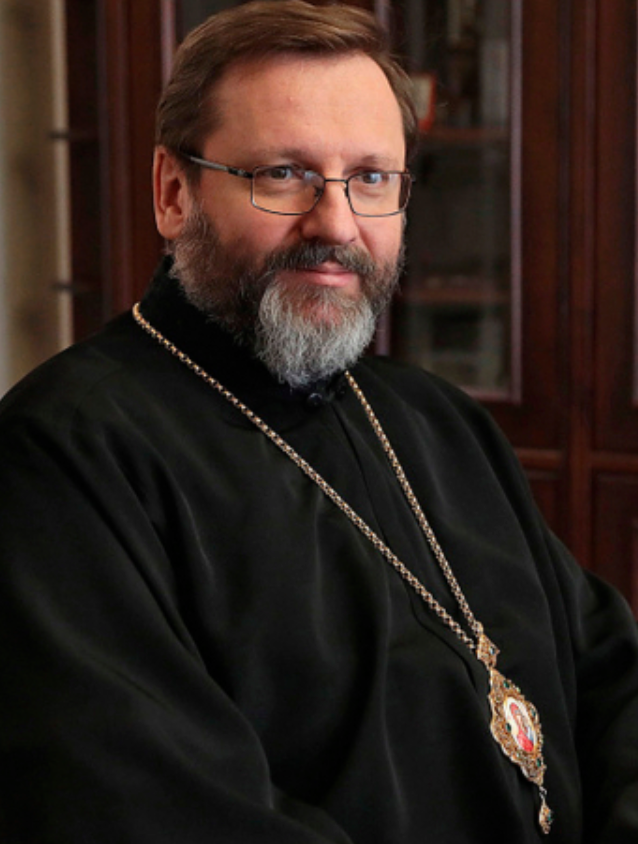 Palm Sunday, the day of Christ’s triumphant entry in Jerusalem, is traditionally for me and the entire leadership of our Church an opportunity to address you with a special letter. I always cherish this opportunity because I consider it a special privilege to reflect together and with you seek answers to questions and needs, which I have heard expressed at various encounters and conversations with you throughout the year.
Palm Sunday, the day of Christ’s triumphant entry in Jerusalem, is traditionally for me and the entire leadership of our Church an opportunity to address you with a special letter. I always cherish this opportunity because I consider it a special privilege to reflect together and with you seek answers to questions and needs, which I have heard expressed at various encounters and conversations with you throughout the year.
This year, in spite of the unique life circumstances in which we find ourselves, you, young people, without going to church due to the restrictions that have been placed on us, can listen to or read this appeal of ours. The Church comes to you, wherever you may be: we hope that the voice which will be heard on screens of various sizes and formats, will resonate in your hearts, lift up and inspire each one of you.
It’s a wonderful thing to be young, but also not easy. Being a youth means having an open heart, an inquisitive mind, and a rebellious character that reacts sharply to all forms of injustice, every distortion, any wrong, which adults have learned to ignore or even exploit. For a young person today the challenge increases with the fast pace and virtualization of the global world, the economic crisis and pandemic. For young Ukrainians there is the additional factor of an unjust war of invasion in the east of the country, a war in which for the seventh year now, sons and daughters of our Fatherland continue to die, while defending peace and the future.
Uncertainty and fear have enveloped the world. Motivational speakers will probably earn millions talking on the topic of “How to live in a time of incertitude.” High-school graduates worry about how they will do their SATs and apply to places of higher learning, while university and college graduates wonder whether they will find a job in a world that seems to heading rapidly towards economic crisis. Proprietors of small coffee shops are anxious about whether they will be able to reopen once the quarantine is over, programmers—whether orders from large international companies will be cancelled, as the financial stability of their businesses depend on them. One has the impression that today there isn’t a single young person who does not worry about the uncertainty that hangs over us.
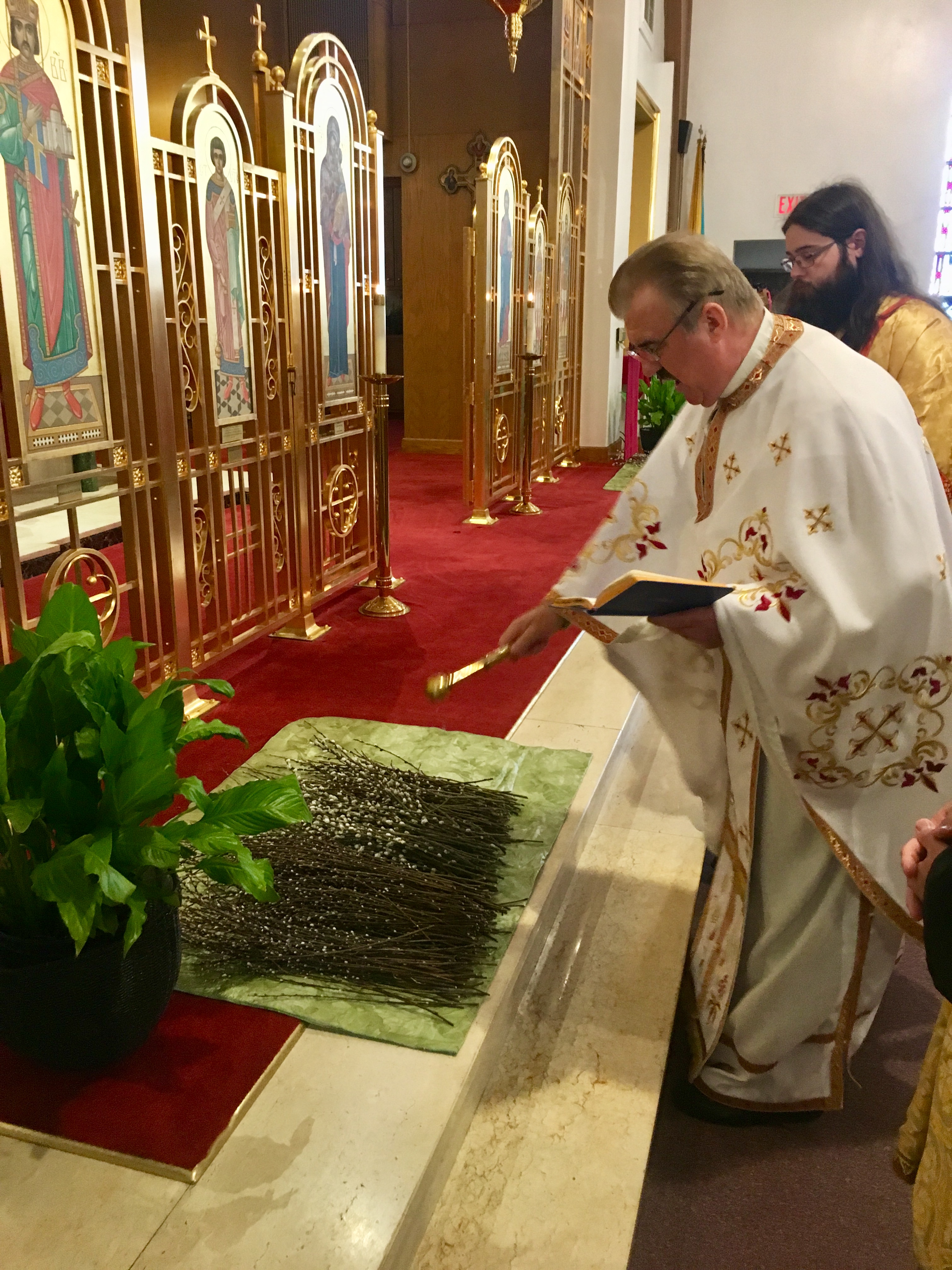 Today is Palm Sunday for those that celebrate on the Gregorian calendar. But for Ukrainians that celebrate today or on April 21st by the Julian calendar this day is called Pussy Willow Sunday or Verbna Nedila [or Flowery Sunday].
Today is Palm Sunday for those that celebrate on the Gregorian calendar. But for Ukrainians that celebrate today or on April 21st by the Julian calendar this day is called Pussy Willow Sunday or Verbna Nedila [or Flowery Sunday]. The blessed willow branches were then taken home. Some of the blessed pussy willow branches were placed above the holy pictures in the home, to protect the household from evil spirits. These branches would replace the branches that had been placed the previous year. The branches which were taken down were carefully burned; a few would be used to light the stove to bake this year’s pasky.
The blessed willow branches were then taken home. Some of the blessed pussy willow branches were placed above the holy pictures in the home, to protect the household from evil spirits. These branches would replace the branches that had been placed the previous year. The branches which were taken down were carefully burned; a few would be used to light the stove to bake this year’s pasky.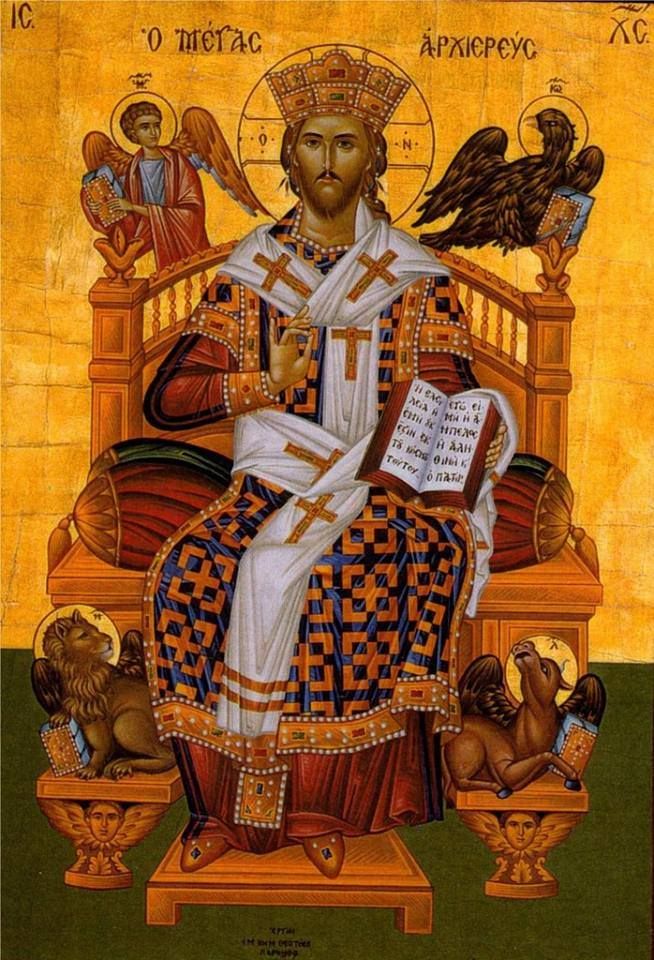 The Roman Church has a separate feast of Christ the King in 1925, with Pius XI’s encyclical Quas Primas. It was to counter the rise of secularism by proclaiming that Christ is the only true king of the believers. The original and ancient feast of Christ the King,
The Roman Church has a separate feast of Christ the King in 1925, with Pius XI’s encyclical Quas Primas. It was to counter the rise of secularism by proclaiming that Christ is the only true king of the believers. The original and ancient feast of Christ the King, 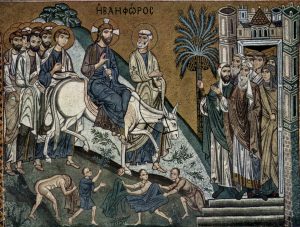 The epistle of the Sunday of Orthodoxy asks us to “keep our eyes fixed on Jesus …” As the forty-day fast ends, we follow Jesus into Jerusalem, where he is received like a king and as the Messiah. Ideally, if we have kept the Fast, we have overcome our evil passions, and are ready to enter the kingdom of God; we have confronted our weakness. This means, as St. Paul points out in today’s epistle: “ … whatever is true, whatever is honorable, whatever is just, whatever is pure, whatever is lovely, whatever is gracious, if there is any excellence and if there is anything worthy of praise, think about these things” (Philippians 4:8).
The epistle of the Sunday of Orthodoxy asks us to “keep our eyes fixed on Jesus …” As the forty-day fast ends, we follow Jesus into Jerusalem, where he is received like a king and as the Messiah. Ideally, if we have kept the Fast, we have overcome our evil passions, and are ready to enter the kingdom of God; we have confronted our weakness. This means, as St. Paul points out in today’s epistle: “ … whatever is true, whatever is honorable, whatever is just, whatever is pure, whatever is lovely, whatever is gracious, if there is any excellence and if there is anything worthy of praise, think about these things” (Philippians 4:8).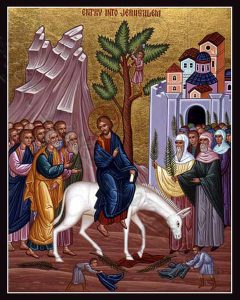 Christ the King
Christ the King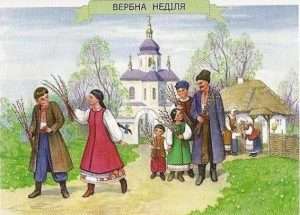 St. Paul describes what the kingdom of God is like in today’s epistle: “ … whatever is true, whatever is honorable, whatever is just, whatever is pure, whatever is lovely, whatever is gracious, if there is any excellence and if there is anything worthy of praise, think about these things” (Philippians 4:8). We must question ourselves today, do we want a king like the mobs did, a political king who will validate our nationalism and support our ideologies, or do we want a king that deifies our souls and hearts and minds? Only the one, true, authentic King can be our redemption and spiritual glorification, in a kingdom established on love of God and love of neighbor. On Holy Saturday, then, we sing, “Let all mortal flesh keep silence and with fear and trembling stand … for the King of Kings and Lord of Lords is coming to be sacrificed and to give himself as food for the faithful” (Cherubic Hymn, Paschal Vigil Liturgy).
St. Paul describes what the kingdom of God is like in today’s epistle: “ … whatever is true, whatever is honorable, whatever is just, whatever is pure, whatever is lovely, whatever is gracious, if there is any excellence and if there is anything worthy of praise, think about these things” (Philippians 4:8). We must question ourselves today, do we want a king like the mobs did, a political king who will validate our nationalism and support our ideologies, or do we want a king that deifies our souls and hearts and minds? Only the one, true, authentic King can be our redemption and spiritual glorification, in a kingdom established on love of God and love of neighbor. On Holy Saturday, then, we sing, “Let all mortal flesh keep silence and with fear and trembling stand … for the King of Kings and Lord of Lords is coming to be sacrificed and to give himself as food for the faithful” (Cherubic Hymn, Paschal Vigil Liturgy).